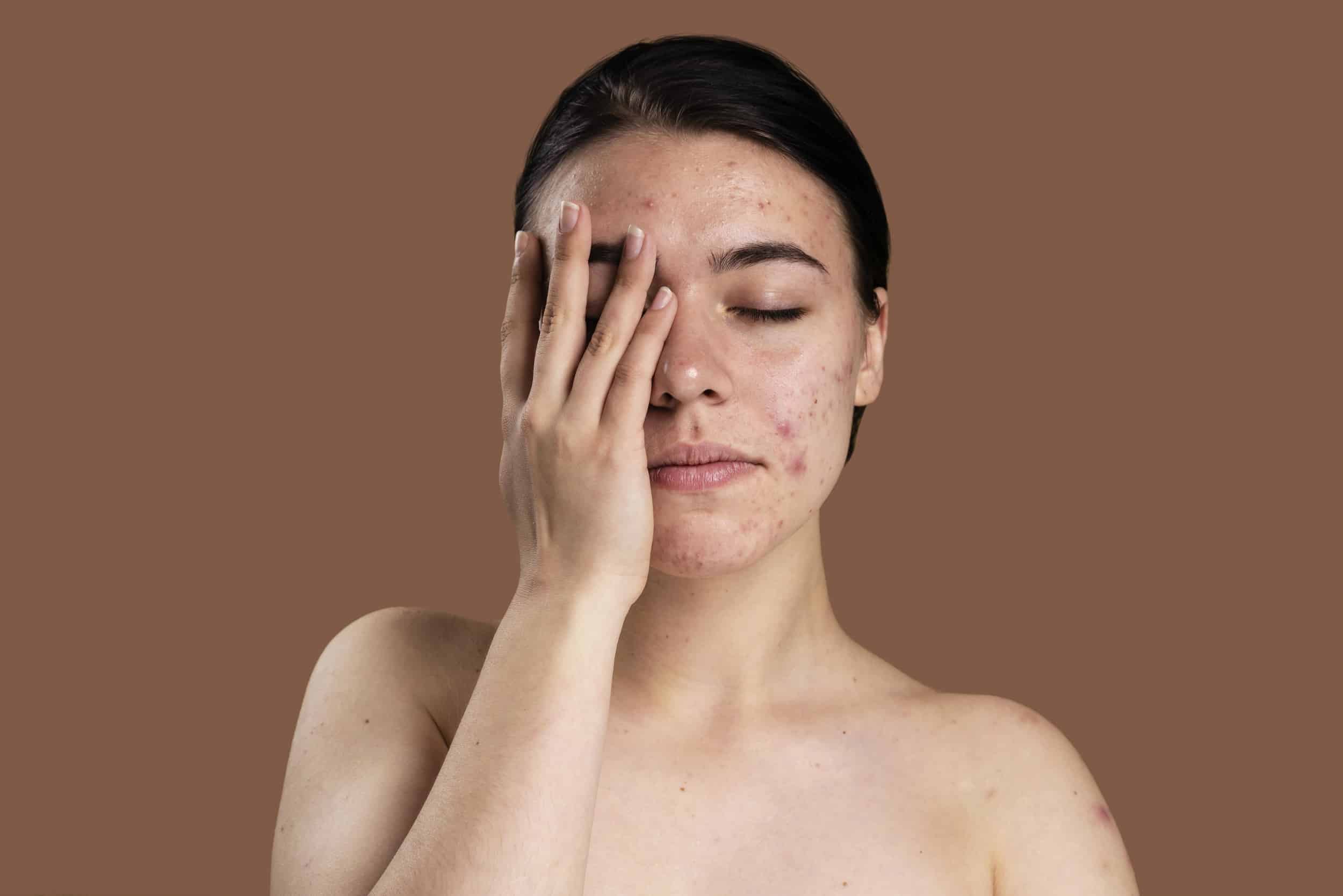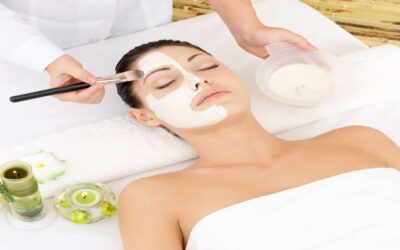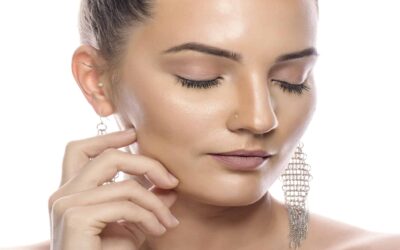The skin is the outermost organ of the human body. It is composed of three layers, each of which is composed of different parts. The uppermost layer, the epidermis, is the one visible to us. It has several glands and pigment containing cells. The epidermis can also regenerate after the dead skin cells slough off several times during a day.
Skin troubles are not uncommon. Our skin tends to undergo changes under the influence of weather, hormones, stress, toxins in the blood, toxins in the atmosphere, and several other factors.
Acne is a common skin issue among people of all generation. In this article, we will dive deep into dry skin type and answer whether dry skin can cause acne.
DIFFERENT SKIN TYPES
Skin types vary from person to person. The most common ones to come across are:
● Normal: neither too dry, nor to moist
● Scaly skin
● Dry skin
● Oily skin
● Sensitive skin
● Combination skin: when the skin exhibits both dry and oily characteristics
WHERE DOES OIL IN SKIN COME FROM?
Oil in the skin is produced by specialized glands known as sebaceous glands. These entities are responsible for sustaining moisture on the skin by producing a substance called ‘sebum’. People with oily skin may have over-functioning sebaceous glands. Excessive oil can clog pores, which in turn gives way to acne.
WHY DO PEOPLE HAVE MIXED SKIN?
There is a more difficult-to-manage skin kind in which oil and dryness exist together. This combination happens when the sebaceous glands are unevenly distributed throughout the skin layer.
DRY SKIN
When our skin lacks adequate moisture to protect itself from the harshness of the environment, it turns dry and scaly. Dry skin can harbor a lot of bacteria and imparts an uneven look. Lack of moisture can also cause cracks and breaks in the skin barrier.
Types of Dry Skin
The scientific term for extremely dry skin is ‘dermatitis.’ It happens when your skin reacts to some adverse stimulus.
Below highlights few different types of dermatitis.
Seborrheic Dermatitis
When the seborrheic glands produce excessive oil, a red scaly rash occurs on the skin, usually on the scalp. It can commonly be observed in infants.
Atopic Dermatitis
‘Eczema’ is the term used interchangeably for atopic dermatitis. It is a skin condition wherein the skin over-reacts to certain factors, such as dry weather.
Irritant Dermatitis
This type of dry skin occurs when the skin turns dry and scaly upon encountering substances that are irritant in nature, such as, chemicals, bleach solutions, etc.
Allergic Dermatitis
This is the condition when the skin is exposed to a substance you are allergic to. For instance, certain skin types are allergic to metals like nickel.
Causes of Dry Skin
Causes of dry skin, in most of the cases, are either related to lifestyle factors or the environment. About ninety percent of them are modifiable. At times people do not realize what is causing their skin to break open and become scaly.
The following explains various common conditions that can pose a skin dry and itchy:
Use of Soaps
As a matter of fact, not every soap has been created for your skin type. There is a high chance that the soap you are using is taking moisture away from your skin. This is especially true in case of harsh soaps.
When choosing a face wash or a shampoo, it is important that you look for the purpose of the product (whether it is created for dry, oily, or sensitive skin). In case you suffer from a medical condition that is causing the dryness, consult a dermatologist who can suggest you the right products.
Cold Temperature
Winters tend to make skin dry and scaly. Hence, it is vital that you use a suitable moisturizer daily to protect your skin from harshness of the weather.
Low Humidity
To your surprise, humidity also influences your skin directly. If the humidity is low in the atmosphere, your skin will remain dry.
Fragrance
A lot of skin types react to strong fragrances (contact dermatitis). If this is your case, then you must opt for products that contain subtle or no fragrance.
Genetics
Well, your genes could simply be the reason why your skin remains dry. Genes determine a lot of factors of our body, ranging from our appearance to our thoughts. In this case, an adequate approach to routine skin care is required for better skin heath.
TREATMENT OF DRY SKIN
As already discussed, the majority of the factors causing skin dryness are reversible. Here are some methods by which you can prevent your skin from turning scaly and itchy:
● Avoid soaps and shampoos that contain strong chemical formulas.
● Add a humidifier to your rooms if you live in a place with low humidity.
● Identify agents that irritate your skin and refrain from using them.
● Avoid clothing that is made of wool. Many skin types react adversely when exposed to wool.
● Use an appropriate moisturizer for your skin regularly. In case you have sensitive skin, consult a skin specialist.
● Cover your face and hands when out in the cold.
● Drink enough water. Ensure adequate hydration.
● Water of extreme temperatures can also de-moisturize your skin. Make sure that the temperature of water is normal when bathing.
● Protect your skin from the harmful UV rays of the sun. Wear appropriate sunblock when out on a sunny day.
CAN DRY SKIN CAUSE ACNE?
Acne is often related to excessive oil on the skin, which, for most of the part, is true. But acne breakouts can also happen even when the skin is dry. Here it why it happens:
Dryness causes breaks and cracks in the skin. These cracks are favored grounds for bacterial growth. The bacteria settle in there and colonize, which in turn produces acne.
The bacteria responsible for causing acne is known as Propionibacterium acnes (P.acnes). It forms a part of the normal flora of the skin, and only produces acne when given favorable conditions.
Dry skin has more dead skin cell build-up. Also, to counteract dryness, the sebaceous glands produce more sebum. These two factors synergistically contribute to acne in dry skin.
HOW CAN I GET RID OF ACNE?
Treating acne is annoying as it keeps returning no matter how much effort you put in. Following are some useful home remedies that can help you get through your problem:
Tea Tree Oil
Tea tree oil is derived from the leaves of Melaleuca alternifolia, a tea plant that is native to Australia. It is also a part of ancient medicine owing to its anti-bacterial and anti-inflammatory properties. Tea tree oil has shown wonders in treating acne.
A study that focused on the efficacy of tea tree extract in cases of mild to moderate acne revealed significant results. Participants were seen to have reduced the number of acne lesions over a period of twelve weeks, and the product was also well-tolerated.
Jojoba Oil
The extract of jojoba oil is produced from the seeds of Simmondsia chinensis plant which is native to the land of China. It has a huge role in the cosmetics and pharmaceutical industry.
The molecular structure of jojoba oil is like that of the ‘sebum’ produced by our skin glands; in other words, applying jojoba oil to skin can help overcome dryness. It contains essential antioxidants such as omega-6 fatty acids, vitamin E and vitamin A.
Honey
This natural ingredient that can be found in your kitchen cabinet can help you get rid of dry skin and acne. Honey works by extracting dirt from the pores, that is, it cleanses your skin thoroughly.
It also drives away the bacteria responsible for causing acne. Honey can be added to your face mask along with a combination of some other natural ingredients such as yogurt, cinnamon, and egg yolk.
Green Tea
Green tea is an all-in-all home remedy used for treating several medical conditions. Having green tea once or twice daily as a part of your regular meal can do wonders to your body.
It contains strong polyphenol antioxidants known as ‘catechins’ that help in driving away the damaging free radicals from the body. It clears the body from toxins. It also helps break the cycle in our body which causes increased sebum production in the skin, thus preventing clogging of pores.
Hygiene
Apart from the remedies, one must follow regular hygiene for skin. It is crucial that acne must not be touched frequently, since it can lead to further contamination. Moreover, never must you pop or squeeze a pimple, as it will only aggravate the existing situation. Facial cleansing using natural oils, ideally a tea tree oil, must be a regular part of your routine.
WHEN SHOULD I SEE A DOCTOR FOR ACNE?
Acne breakouts can be a nightmare. They are painful, itchy, sore, and they often bleed. Many times, acne breakouts are a result of hormonal disbalance, especially in case of teenagers and women of child-bearing age.
Many young girls can notice the cyclic pattern of their acne which coincides with their monthly cycles. In the luteal phase, which comes a few days before the onset of menstruation, there is a surge in androgen levels that stimulate the sebaceous glands into producing more sebum. This results in an excessive oily skin which gives rise to acne.
If you think that your acne is a result of hormonal imbalance, you must first seek a certified dermatologist before going for any remedy or therapy.
DERMATOLOGICAL PROCEDURES FOR ACNE
Microdermabrasion
This in-office procedure is minimally invasive, wherein an apparatus with an abrasive surface is gently moved across the skin to scrape away the dead-skin cell layer.
Dermaplaning
This is also a minimally invasive procedure, except that it incorporates the use of a specialized blade to exfoliate the skin.
Chemical Peel
Alpha and beta hydroxy acids are used to peel away the dead cell layer off the skin so to let the live skin beneath breath fresh air.
KEY TAKEAWAYS
Acne is a result of excessive oil production and dead skin cell build up, both of which clog the pores and cover up the underlying fresh skin. The factors that contribute to acne breakout are mostly modifiable. It is crucial to identify your skin type and to determine what elements harm it. A doctor’s consultation must never be delayed if there is an unresolving acne breakout for a long time.
Article Sources
HealthxTips is committed to delivering content that adheres to highest standard for accuracy, sourcing and objective analysis.
HealthxTips uses only high-quality and trustworthy sources to support the facts in our articles.
1. Kim, S., Park, T. H., Kim, W. I., Park, S., Kim, J. H., & Cho, M. K. (2021). The effects of green tea on acne vulgaris: A systematic review and meta-analysis of randomized clinical trials. Phytotherapy research : PTR, 35(1), 374–383. https://doi.org/10.1002/ptr.6809
2. Lin, T. K., Zhong, L., & Santiago, J. L. (2017). Anti-Inflammatory and Skin Barrier Repair Effects of Topical Application of Some Plant Oils. International journal of molecular sciences, 19(1), 70. https://doi.org/10.3390/ijms19010070
3. Malhi, H. K., Tu, J., Riley, T. V., Kumarasinghe, S. P., & Hammer, K. A. (2017). Tea tree oil gel for mild to moderate acne; a 12 week uncontrolled, open-label phase II pilot study. The Australasian journal of dermatology, 58(3), 205–210. https://doi.org/10.1111/ajd.12465
4. Mandal, M. D., & Mandal, S. (2011). Honey: its medicinal property and antibacterial activity. Asian Pacific journal of tropical biomedicine, 1(2), 154–160. https://doi.org/10.1016/S2221-1691(11)60016-6







0 Comments